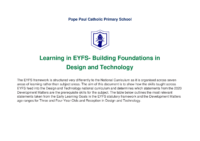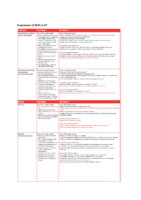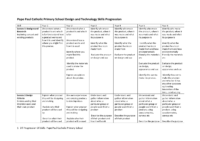Design Technology
DT at Pope Paul Catholic Primary School
At Pope Paul School we use the Projects on a Page which is a national scheme of work for primary design and technology (D&T) based on the six essentials of good practice in D&T ensuring that children’s learning is genuinely design and technological in nature. They are consistent with the new National Curriculum requirements and are applied whenever children are designing and making products:
User
Children have a clear idea of who they are designing and making products for, considering their needs, wants, interests or preferences. The user could be themselves, an imaginary character, another person, client, consumer or a specific target audience.
Purpose
Children know what the products they design and make are for. Each product performs a clearly defined task that can be evaluated in use.
Functionality
Children design and make products that function in some way to be successful. Products often combine aesthetic qualities with functional characteristics. In D&T, it is insufficient for children to design and make products which are purely aesthetic.
Design Decisions
When designing and making, children make opportunities to make informed decisions such as selecting materials, components and techniques and deciding what form the products will take, how they will work, what task they will perform and who they are for.
Innovation
When designing and making, children have scope to be original with their thinking. Projects that encourage innovation lead to a range of design ideas and products being developed, characterised by engaging, open-ended starting points for children’s learning.
Authenticity
Children should design and make products that are believable, real and meaningful to themselves i.e. not replicas or reproductions or models which do not provide opportunities for children to make design decisions with clear users and purposes in mind.
We strive to embed these six essentials into our teaching and learning of DT.
Long Term Planning
The following chart shows the progression of topics throughout the school.
| Year 1 | Mechanisms
Sliders and levers |
Structures
Freestanding structures |
Food
Preparing fruit and vegetables( including cooking and nutrition requirements for KS1) |
| Year 2 | Mechanisms
Wheels and axles |
Food
Preparing fruit and vegetables (including cooking and nutrition requirements for KS1) |
Textiles
Templates and joining techniques |
| Year 3 | Structures
Shell structures including computer aided design) |
Food
Healthy and varied diet ( including cooking and nutrition requirements for KS2) |
Textiles
2D shape to 3D product |
| Year 4 | Mechanical Systems
Levers and linkages |
Electrical Systems
Simple circuits and switches ( including programming and control) |
Food
Healthy and varied diet (including cooking and nutrition requirements for KS2) |
| Year 5 | Food
Celebrating culture and seasonality (including cooking and nutrition requirements for KS2) |
Structures
Frame structures |
Electrical systems
More complex switches and circuits (including programming, monitoring and control) |
| Year 6 | Textiles
Combining different fabric shapes (including computer-aided design) |
Food
Celebrating culture and seasonality (including cooking and nutrition requirements for KS2) |
Mechanical systems
Pulleys and gears |
Progression of Skills






